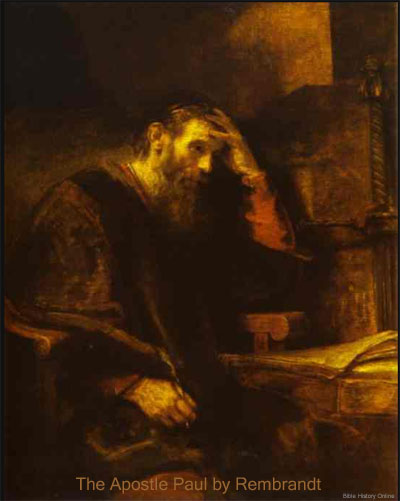The Book of 1 Corinthians
1 Corinthians 4:5 - Therefore judge nothing before the time, until the Lord come, who both will bring to light the hidden things of darkness, and will make manifest the counsels of the hearts: and then shall every man have praise of God.
1 Corinthians 13:4-7 - Charity suffereth long, [and] is kind; charity envieth not; charity vaunteth not itself, is not puffed up, Doth not behave itself unseemly, seeketh not her own, is not easily provoked, thinketh no evil; Rejoiceth not in iniquity, but rejoiceth in the truth; Beareth all things, believeth all things, hopeth all things, endureth all things.
1 Corinthians in The New Testament - A Brief Overview

Painting of Paul the Apostle by Rembrandt - 1657
Introduction to The Book of 1 Corinthians
Brief Summary. Paul exhorts the church at Corinth regarding disorders, problems, abuses, and heresies.
Summary of The Book of 1 Corinthians
Purpose. Paul desired to correct some of the problems that had arisen at the church in Corinth. Paul addresses questions which the church at Corinth had sent to him in a letter delivered by Fortunatus, Stephanus, and Achaicus. Paul deals with each problem individually in order. He rebukes the parties which arose from a divisive spirit and a failure to humble themselves before the true wisdom of God. He also rebukes strongly a case of incest which existed in the church. He also encourages the believers to settle disputes among themselves and the church, not bringing lawsuits into heathen courts. He also urges Christians to "flee fornication," which was obviously a big problem in licentious Corinth. Paul also deals with many of the problems connected with marriage. He then discusses Christian liberty and how to live in a community filled with idolatry. He also instructs the church regarding the conduct of women in public worship and the abuses concerning the Lord's Supper. He also urges Christians to desire spiritual gifts and to use them properly. 1 Corinthians 13 is the famous "love" chapter and Paul defines what true Christian love is. Paul also addresses the resurrection of the dead, and the glorified bodies awaiting the believers in Christ. He encourages the church at Corinth to take up a collection for the poor at Jerusalem, and he lets them know that he intended visit to Corinth soon. He concludes with practical concerns as well as the customary salutations, warnings, and benediction.
Authorship. Paul was the author of the book of 1 Corinthians.
Date. Most scholars agree that 1 Corinthians was written in 55 AD
Place of Writing. Ephesus (1 Corinthians 16:8).
Outline of the Book of 1 Corinthians
Unity Versus Division - Chapters 1-3
Order Versus Disorder - Chapters 4-11
Church Gifts, Love, and Doctrines - Chapters 12-16

The Name Jesus In Ancient Hebrew Text
"Yeshua" in First Century Hebrew Text. This is how the name "Jesus"
would have been written in ancient Hebrew documents. The four letters or
consonants from right to left are Yod, Shin, Vav, Ayin (Y, SH, OO, A).
Jesus is the Greek name for the Hebrew name Joshua or Y'shua which means
"The LORD or Yahweh is Salvation".
1 Corinthians Maps and Resources
Map of the Roman Empire (14 A.D.) - This map reveals the Roman Empire during the time shortly after the birth of Jesus, in 14 AD at the time of the death of Augustus. The order which prevailed in this extensive empire, the good military roads, and the use of Koine Greek as the general language of culture throughout the area were among the factors which multiplied the rapid spread of the Gospel of Jesus Christ. (Color Map)
Map of Paul's First Missionary Journey (48 A.D.) - This map reveals the areas in Asia Minor where Paul visited in his first missionary journey. Around 48 AD, in the springtime, Paul and his companions Barnabas and Mark were sent on a mission from the church in Antioch. This would be the first of Paul's Missionary Journey's. (Color Map)
Map of Paul's Second Missionary Journey (51 A.D.) - This map reveals the areas in Asia and Greece where Paul visited in his second missionary journey. Paul re-visits a couple cities in Asia, one of which was Lystra where he was stoned and left for dead a few years earlier. He later has a vision that leads him over to Greece and Paul and his companions travel and minister in various cities in Greece (Philippi, Thessalonica, Berea, Athens and Corinth. Later Paul returns to Ephesus and finally to Caesarea and Antioch. (Color Map)
Map of Paul's Third Missionary Journey (54 A.D.) - This map reveals the areas in Asia and Greece where Paul visited in his third missionary journey. On Paul's third missionary journey he returned to the cities he had first visited on his first missionary journey. During this time he decided to remain in Ephesus for about 3 years, and this city was the main focus of his activities and an important Christian community (Acts 19). (Color Map)
Map of the New Testament World - This map reveals the "Nations" within the ancient world during the first century A.D., the time of the New Testament. The map includes the areas of Israel, Asia, Greece, and Italy. (Color Map)
Map of New Testament Greece This map reveals the cities
within Greece in the ancient world during the first century
A.D.,The map includes the principal cities of Greece like:
Athens, Corinth, and Thessalonica, and provinces like Macedonia
and Achaia. (Color Map)